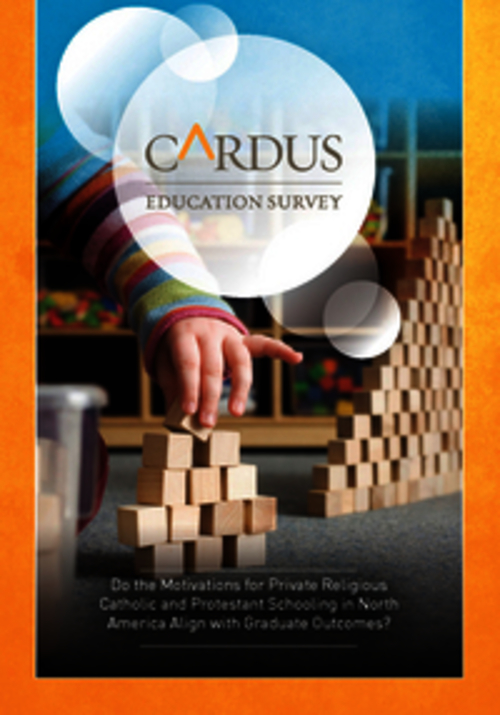A peek into the findings of the Cardus Education Survey (CES) was released last week, featuring the largest representative sample of Christian school graduates with the aim to discover the alignment between motivations and outcomes of Christian education. Read the entire coverage of the Cardus Education Survey here.

Christian school motivations, outcomes assessed in study
May 30, 2011

OACS covers Cardus study on Christian schooling
May 30, 2011

Protestant, Catholic graduates differ
May 29, 2011

Protestant, Catholic graduates differ
U.S. News covers the Cardus Education Survey in Washington D.C. WASHINGTON, May 29 (UPI) -- The graduates of Protestant Christian schools have different traits than those who attend Catholic and non-religious private schools, U.S. researchers say. Read more.
May 29, 2011

Are Christian School Graduates World-Changers?
A few decades ago, Mark Noll wrote The Scandal of the Evangelical Mind as an “epistle from a wounded lover,†lamenting that “there is not much of an evangelical mind.†Christians have largely abandoned universities, the arts, and other realms of “high culture,†he argued. A decade later, Michael Lindsay reported the evangelical movement, usually thought of as belonging to the “disadvantaged ranks of the stratification system†had advanced in recent years so that “it now wields power in just about every segment of American society.†Read the full article from Capital Commentary here.
May 20, 2011

Was the Osama bin Laden killing an act of just war?
Insofar as it has an official stance on the morality of waging war, the Church of England is broadly committed to the "just war" tradition, a developing body of principles governing the legitimacy of military force and the constraints on its use, now partially encoded in the international law of war. So when senior Anglican clergy pronounce publicly on the deployment of military force (as they have every right to do) it is natural to inquire whether their thinking is materially informed by that tradition. The archbishop of Canterbury's disclosure of his "very uncomfortable feeling"' about Osama bin Laden being unarmed when he was killed was coaxed out of him during a short press conference in which he could not have been expected to set out the full stall of Anglican (or his own) thinking. But Professor Tom Wright, until recently Bishop of Durham, also made no mention of that body of thought in his more considered opinion piece. Wright implied that the killing was an act of "wild-west vigilantism" driven by the myth of American exceptionalism. That myth has certainly played a recurring and sometimes terribly damaging role in American foreign policy and it certainly merits a Christian response informed, for example, by the kind of biblical critique of "empire" powerfully rearticulated in recent years by Wright himself. But to assess whether or not any particular US military operation was an instance of "vigilantism", we need to go beyond the myth of exceptionalism and test the act against specific just war criteria. Just war principles were originally formulated to apply to military engagements between states, but they can legitimately be extended to an international terrorist organisation like al-Qaida, which has openly declared (and amply proved) itself actively engaged in a violent global campaign against the US and many other states involving the indiscriminate mass killing and maiming of civilians. The Metropolitan police chief put it thus: "Osama bin Laden led an organisation which is responsible for the injury and death of thousands of people worldwide in the name of an extreme and perverted ideology, committed to the use of terror and murder to achieve their aims." Bin Laden was not only "a war criminal", as the archbishop rightly noted, but arguably also an active combatant. The just war criterion of "just cause", in this case the protection of innocent civilians and military personnel from arbitrary attack, clearly legitimates putting the leadership of such an organisation out of action. If military means are the only option, then the just war principle of "last resort" permits them. Before the raid the US had every reason to suppose that al-Qaida was constantly engaged in planning or encouraging such acts (and subsequent reports confirm that), which makes its leadership a legitimate target for capture or killing, at any time. Assuming just cause, did the methods used in this operation meet the just war principle of "just means"? This requires, for example, that the force used be proportionate to the end in view and that there be no intentional killing of noncombatants. As of now, we do not yet possess sufficient information about precisely what transpired during the raid itself to reach a firm conclusion on that question. This may be why most experts in international law have so far hesitated to offer definitive judgements. The precise requirements of "just means" depend crucially on the exact circumstances of the case. For example, whether it might be just to kill an unarmed Bin Laden could depend on whether he was legitimately assumed to be wearing a concealed suicide vest. But UN human rights investigators (and others) are certainly justified in calling for as full disclosure as possible in order to establish whether or not the rule of law was indeed upheld in this case. Another crucial just war principle is "right authority," requiring that the agent taking the action is a legitimate political authority. The US government is a legitimate authority, and since US citizens are a principal al-Qaida target their government is entitled to take necessary action against it to protect them. But should it have deferred to the legitimate authority of the Pakistan government to carry out the assault, or at least sought its permission? International law does seem to rule out violations of another state's sovereignty even in pursuit of a just cause. So if the Pakistan government could have been relied upon to carry out the raid successfully, the answer would be yes. But, notwithstanding the costly efforts of Pakistan against terrorism, the fact remains that there was a high risk that any information passed even to its highest levels of government could have led to Bin Laden being tipped-off. So it is at least arguable that in this exceptional case, the US was morally and legally justified in bypassing that requirement. This doesn't yet amount to a conclusive defence of the US action but it does at least gesture towards the kind of assessment required if a military operation is to be deemed a case of vigilantism or of justice.
May 12, 2011

Daily Commercial News on Cardus trades review
Decisions about the future of the Ontario College of Trades are hampered by a lack of research, says Hamilton-based think-tank Cardus. "It is a classic case of building infrastructure without a plan, and it leaves Ontario's construction industry, already facing a severe shortage of workers, innovation-vulnerable," says Michael Van Pelt, Cardus president. "Workers in this province might soon face fines or be prevented from working in their trade, all by a body which has not provided clear reasons backed by independent research."
May 12, 2011

Religion, royalty and the media
Kirsty Wark's frozen, disdainful grimace said it all. Anchoring Newsnight on the evening of the royal wedding, she found herself completely at a loss to know how to respond to Martin Bashir's unexpected mention of religion. Presumably invited as a studio guest on the strength of his explosive interview with Princess Diana in 1995, Bashir had the poor taste to point out that the event for which the BBC had been providing round-the-clock coverage was actually a religious service. Wark and her other two guests, like pretty much every commentator throughout the day - had been largely taken up with the surface imagery of the day's proceeding. Some of this was quite innocent, though not even a hardy, seasoned Newsnight presenter like Wark could resist yet more obsessive indulgence in "that dress". Even myth-busting historian Simon Schama had been getting progressively intoxicated throughout the day with his own gushing monarchical sentimentalism. Bashir broke ranks by choosing to point out, jarringly but accurately, that other commentators had been ignoring the actual content of the service in Westminster Abbey which was, not surprisingly, religious. Citing the rich theological content of the hymns and scripture reading, he proceeded to offer a brief summary of the bishop of London's homily which had spoken of the wedding not as a royal or a celebrity marriage but, as one might expect from an Anglican bishop - as a Christian event in which marriage is seen as established and sustained by God. Palpably discomfited, Wark abruptly turned away from Bashir and yanked the discussion back to the day's familiar secular preoccupations. A journalist with a modicum of religious fluency would have followed up Bashir's surprising and arresting remarks with a question such as 'so do you think the religious nature of the service has any real significance for British society today?' Except that the BBC already knows the answer to that question so it needn't even be put. This is only another familiar episode revealing the religious illiteracy of much of the contemporary British media (CiF Belief excepted, of course). Wark's blanking of Bashir might, perhaps, be defended by media professionals as a necessary consequence of media "neutrality". The argument would be that to have indulged Bashir's remarks about the bishop's Christian theology of marriage might have been seen as favouring a specific religious perspective, or to give undue weight to religion in a secular society more interested in fashion houses than houses of prayer. But completely ignoring the theological content which alone can make any sense at all of the richly-textured liturgical goings on in Westminster Abbey is itself a substantive and controversial statement about the social significance of religion in general and the constitutional significance of Christianity in particular. It may or may not be true that religion has become largely insignificant in British society, but there is no neutral or objective standpoint from which to reach that judgement. Will the media dare to have a serious discussion about that question? If coverage of the royal wedding poses a question to the media about the principle of journalistic neutrality, the service itself poses a different one to the church about the principle of Anglican establishment. The Church of England cannot be held primarily responsible for the media's ignoring of the theological content of the service over which the church presided (though perhaps it might have stipulated, as a condition of allowing TV cameras into the Abbey, that one of its spokespersons should be given airtime to interpret the service). But it surely is primarily responsible for how far the liturgical offerings it seems so eager to supply to what is a largely inattentive and uncomprehending nation are actually consistent with its own theological integrity, even its self-respect. For many defenders of establishment, the royal wedding will no doubt provide glorious confirmation of their claim that the church remains the spiritual hub of the nation, sending out signals of transcendence from the heart of a unifying national celebration. For many opponents, it will raise the question whether the meaning of even a robustly orthodox wedding liturgy, for such it certainly was, as Martin Bashir so tactlessly pointed out, is effectively neutered when placed in service of a survival strategy for a political institution with an uncertain future. They will interpret the day's events as yet further evidence of church's captivity to civil religion, and will ask whether on April 29th the church really "served" the nation or rather was "used" by it. Will the church dare to have a serious discussion about that question?
May 1, 2011

Making Peace at the Dinner Table
Locavorism might be the sexiest trend of the decade, and Wendell Berry is its prophet. His sharp criticisms of agriculture and food politics are only the leading edge of a growing dissatisfaction with how we relate to one another in the progressively enormous systems within which we have embedded, some would say compromised, our humanity. But this angry opposition is often mystifying to the politically and economically orthodox. Why would anyone resist the production of more food in a hungry world, or turn against the clear social and political advantages of modern systems and technology? Questions of humanity and justice in a globalized world seem at loggerheads, and rarely do the two sides meet. Two recent books are helpful to Christians who want to get their heads around this debate. Food policy expert Robert Paarlberg, professor of political science at Wellesley and associate at Harvard's Weatherhead Center for International Affairs, authored Food Politics: What Everyone Needs to Know. It's full of measured, carefully researched answers to food policy catfights, from "What causes famine?" to "Was the green revolution bad for the environment?" to "Is the food industry to blame for the way we eat?" By contrast, in What Matters? Economics for a Renewed Commonwealth, America's prophetic voice in the wilderness, Wendell Berry, takes the deep view on what he sees as the endemic crisis in modern agriculture and economy. The two books are studies in opposites: the one detached and dispassionate, the other fiery and poetic. Wendell Berry waxes long on our failures while Robert Paarlberg tries to build on our successes. Reading one against the other gives us a way to think, broadly and deeply, about food and, maybe, might also finally bring some political balance to the dinner table. Read the entire article at Books & Culture.
April 27, 2011
